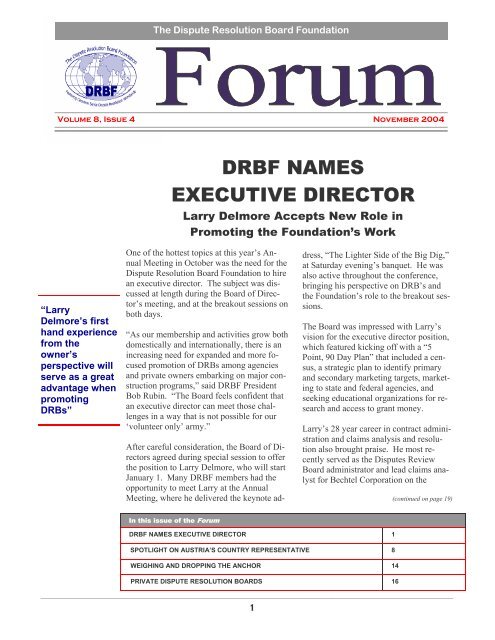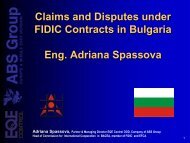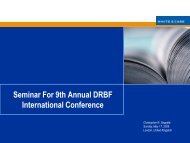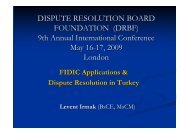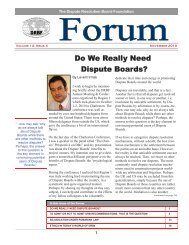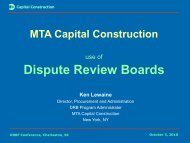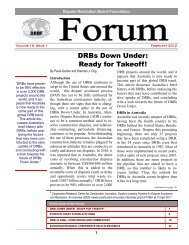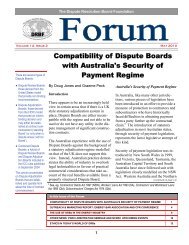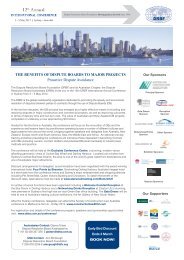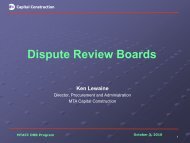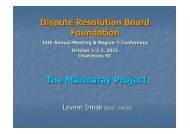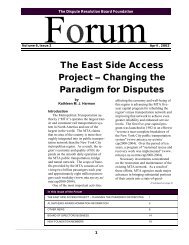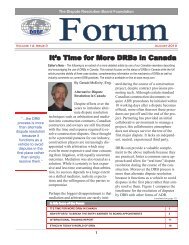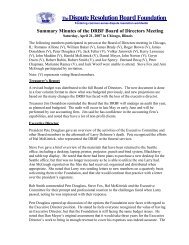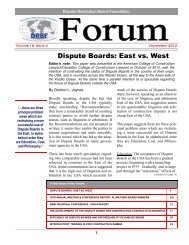DRBF NAMES EXECUTIVE DIRECTOR - Dispute Resolution Board Foundation
DRBF NAMES EXECUTIVE DIRECTOR - Dispute Resolution Board Foundation
DRBF NAMES EXECUTIVE DIRECTOR - Dispute Resolution Board Foundation
Create successful ePaper yourself
Turn your PDF publications into a flip-book with our unique Google optimized e-Paper software.
The <strong>Dispute</strong> <strong>Resolution</strong> <strong>Board</strong> <strong>Foundation</strong><br />
Volume 8, Issue 4 November 2004<br />
<strong>DRBF</strong> <strong>NAMES</strong><br />
<strong>EXECUTIVE</strong> <strong>DIRECTOR</strong><br />
Larry Delmore Accepts New Role in<br />
Promoting the <strong>Foundation</strong>’s Work<br />
“Larry<br />
Delmore’s first<br />
hand experience<br />
from the<br />
owner’s<br />
perspective will<br />
serve as a great<br />
advantage when<br />
promoting<br />
DRBs”<br />
One of the hottest topics at this year’s Annual<br />
Meeting in October was the need for the<br />
<strong>Dispute</strong> <strong>Resolution</strong> <strong>Board</strong> <strong>Foundation</strong> to hire<br />
an executive director. The subject was discussed<br />
at length during the <strong>Board</strong> of Director’s<br />
meeting, and at the breakout sessions on<br />
both days.<br />
“As our membership and activities grow both<br />
domestically and internationally, there is an<br />
increasing need for expanded and more focused<br />
promotion of DRBs among agencies<br />
and private owners embarking on major construction<br />
programs,” said <strong>DRBF</strong> President<br />
Bob Rubin. “The <strong>Board</strong> feels confident that<br />
an executive director can meet those challenges<br />
in a way that is not possible for our<br />
‘volunteer only’ army.”<br />
After careful consideration, the <strong>Board</strong> of Directors<br />
agreed during special session to offer<br />
the position to Larry Delmore, who will start<br />
January 1. Many <strong>DRBF</strong> members had the<br />
opportunity to meet Larry at the Annual<br />
Meeting, where he delivered the keynote address,<br />
“The Lighter Side of the Big Dig,”<br />
at Saturday evening’s banquet. He was<br />
also active throughout the conference,<br />
bringing his perspective on DRB’s and<br />
the <strong>Foundation</strong>’s role to the breakout sessions.<br />
The <strong>Board</strong> was impressed with Larry’s<br />
vision for the executive director position,<br />
which featured kicking off with a “5<br />
Point, 90 Day Plan” that included a census,<br />
a strategic plan to identify primary<br />
and secondary marketing targets, marketing<br />
to state and federal agencies, and<br />
seeking educational organizations for research<br />
and access to grant money.<br />
Larry’s 28 year career in contract administration<br />
and claims analysis and resolution<br />
also brought praise. He most recently<br />
served as the <strong>Dispute</strong>s Review<br />
<strong>Board</strong> administrator and lead claims analyst<br />
for Bechtel Corporation on the<br />
(continued on page 19)<br />
In this issue of the Forum<br />
<strong>DRBF</strong> <strong>NAMES</strong> <strong>EXECUTIVE</strong> <strong>DIRECTOR</strong> 1<br />
SPOTLIGHT ON AUSTRIA’S COUNTRY REPRESENTATIVE 8<br />
WEIGHING AND DROPPING THE ANCHOR 14<br />
PRIVATE DISPUTE RESOLUTION BOARDS 16<br />
———————————————————————————————————————————————————<br />
1
<strong>Foundation</strong> Forum<br />
I am pleased to take the <strong>DRBF</strong> reins and look forward to a productive<br />
year. I believe the Annual Meeting established a turning point for the<br />
<strong>Foundation</strong>. There was strong consensus that the organization has<br />
reached the point where it must hire an executive director to further its<br />
development. As pointed out by Peter Chapman in the last issue of the<br />
Forum, the <strong>Foundation</strong> is entering its ninth year and has functioned quite<br />
well as an all “volunteer army.” Our administrative manager, Steve Fox, has efficiently<br />
and admirably carried out the tasks needed for our internal organization. However, despite<br />
the best intentions of our hard working members, follow through on our external<br />
organizational tasks necessarily takes a back seat to the demands of our primary employment.<br />
As our membership and activities expand, there is an increasing need for more<br />
focused promotion of DRBs among agencies and private owners embarking on major<br />
construction programs, as well as development of <strong>Foundation</strong> membership and activities.<br />
Retaining an executive director will require expanded funding sources. A consensus of<br />
Annual Meeting attendees supported a membership dues increase for this purpose. However,<br />
we recognize increased dues alone cannot support an executive director. Therefore<br />
additional sources will be sought, such as foundation grants and corporate gifts. After<br />
considering several candidates, the <strong>Board</strong> decided with strong consensus to hire Larry<br />
Delmore. Annual Meeting attendees had the opportunity to meet Larry during breakout<br />
sessions, and to hear his keynote address during the awards ceremony. I have personally<br />
known Larry for over 20 years, and am pleased he has agreed to take the helm and lead<br />
the <strong>Foundation</strong> to the next level. You will learn more about Larry in the cover article of<br />
this newsletter, and in the coming months. I encourage you to give him a call and share<br />
your input on what he can do to lead this organization in the right direction.<br />
A second challenge being undertaken by the board of directors is that of expanding and<br />
revamping the <strong>Foundation</strong>’s educational program. Under the leadership of Education<br />
and Training Committee Chair Bart Bartholomew, an exciting proposal is under development<br />
for three new types of workshops: (1) workshops specially tailored to the training<br />
needs of specific state DOTs and similar agencies; (2) promotional workshops for public<br />
and private entities that are new users of DRBs; and (3) advanced workshops for present<br />
<strong>DRBF</strong> practitioners. We will report the details of these workshops as they develop.<br />
During the breakout sessions at the Annual Meeting, a proposal was advanced that certainly<br />
merits further consideration, namely the creation of different levels of membership<br />
based upon experience and training. One could start as an Associate Member, then progress<br />
to Member, and finally be elected to Fellow or Diplomat of the <strong>Foundation</strong>. The<br />
purpose of creating these membership levels would be to provide relevant information to<br />
those seeking candidates for selection to sit on DRBs.<br />
Finally, the <strong>DRBF</strong> is in discussions with the U.S. Council for International Business<br />
(USCIB) to present a training seminar on new ICC <strong>Dispute</strong> <strong>Board</strong> documents. Since the<br />
USCIB includes most major U.S. companies active in international commerce, the dispute<br />
board concept is likely to be of interest to them on projects in and outside the U.S.<br />
I hope you will correspond with me relative to these and other matters of concern to you,<br />
so that the <strong>Foundation</strong> can better serve your needs and interests.<br />
Sincerely,<br />
President’s Page<br />
THE DISPUTE<br />
RESOLUTION BOARD<br />
FOUNDATION<br />
OFFICERS<br />
President<br />
Robert A. Rubin<br />
President Elect<br />
Harold V. McKittrick<br />
Past President<br />
Peter H.J. Chapman<br />
Secretary/Treasurer<br />
Peter M. Douglass<br />
<strong>DIRECTOR</strong>S<br />
Armando Ribeiro Araujo<br />
Washington, DC<br />
William W. Edgerton<br />
San Francisco, California<br />
J.L. (Jack) Feller<br />
Grass Valley, California<br />
Sammie D. Guy<br />
Falls Church, Virginia<br />
Gordon L. Jaynes Esq.<br />
Surrey, England<br />
Igor V. Leto<br />
Roma, Italy<br />
John W. Nichols, P.E.<br />
Corte Madera, California<br />
John C. Norton, P.E.<br />
Tampa, Florida<br />
Gwyn Owen<br />
Wrexham, United Kingdom<br />
D.L. (Josh) Randall<br />
Sylmar, California<br />
Brison S. Shipley<br />
Hull, Massachusetts<br />
William B. Baker, P.E.<br />
Calistoga, California<br />
James P. Donaldson<br />
Seattle, Washington<br />
Daniel F. Meyer<br />
Lake Forest, Illinois<br />
Jack J. Woolf<br />
Charlotte, North Carolina<br />
———————————————————————————————————————————————————<br />
2
Forum Editor:<br />
Ann McGough<br />
Editorial and<br />
subscription address:<br />
<strong>Dispute</strong> <strong>Resolution</strong><br />
<strong>Board</strong> <strong>Foundation</strong>,<br />
6100 Southcenter Blvd.,<br />
Suite 115, Seattle, WA<br />
98188-2441<br />
Phone: 206-248-6156<br />
Fax: 206-248-6453<br />
Toll free (US only)<br />
888-523-5208<br />
E-mail: home@drb.org<br />
Web site: www.drb.org<br />
The Forum is published<br />
quarterly by the <strong>Dispute</strong><br />
<strong>Resolution</strong> <strong>Board</strong><br />
<strong>Foundation</strong> (<strong>DRBF</strong>). Any<br />
opinions expressed are<br />
those of the authors and<br />
do not necessarily<br />
represent the opinions<br />
of the <strong>DRBF</strong>.<br />
The Forum welcomes<br />
articles on all aspects of<br />
<strong>Dispute</strong> <strong>Resolution</strong><br />
<strong>Board</strong>s, and members<br />
are encouraged to submit<br />
articles or topics to<br />
the <strong>DRBF</strong>, attn: Editor.<br />
All rights reserved. Any<br />
reproduction or utilization,<br />
except that which<br />
constitutes fair use under<br />
federal copyright<br />
law, is a violation of our<br />
copyrights. Written permission<br />
is needed to<br />
reprint more than 300<br />
words.<br />
Please send change of<br />
address with a copy of a<br />
recent mailing label six<br />
weeks in advance.<br />
Copyright © 2004<br />
<strong>Dispute</strong> <strong>Resolution</strong><br />
<strong>Board</strong> <strong>Foundation</strong><br />
<strong>Foundation</strong> Forum<br />
Committee Reports<br />
Note: The following committee reports<br />
are an overview of 2004 presented at<br />
the Annual Meeting and Conference.<br />
Best Practice<br />
The final drafts of the suite of Best Practices<br />
documents have been completed and<br />
submitted to the board of directors of the<br />
<strong>DRBF</strong> for approval at the Annual Meeting.<br />
These drafts (USERS – 10/01/04, MEM-<br />
BERS – 10/01/04 and HEARINGS<br />
10/01/04) have incorporated BPG Committee<br />
member comments as well as comments<br />
from the Manual Committee and board of<br />
directors. All major differences have been<br />
reconciled with the Manual Committee with<br />
respect to philosophy and direction.<br />
It was agreed at the board of directors meeting<br />
of July 9, 2004 that the BPG Guidelines<br />
not only would be “stand alone” documents<br />
but also would be incorporated into the<br />
Manual. It was agreed at that time that Best<br />
Practices Guidelines for Users would be<br />
placed in Appendix A, Section 2 and Best<br />
Practices Guidelines for <strong>Board</strong> Members<br />
and the Conduct of Hearings would be<br />
placed in Appendices B and C of Section 3<br />
of the Manual. However, the Manual Committee<br />
currently is re-examining where the<br />
guidelines best fit in the Manual.<br />
The draft guidelines were included in the<br />
Annual Conference packages distributed to<br />
the conference attendees as well as the<br />
packages for all attendees at the board of<br />
directors meeting. The president has suggested<br />
that the draft guidelines also be published<br />
in the Forum with an accompanying<br />
note by the BPG Chairman. The package<br />
of documents will be submitted to the Forum<br />
as well as put on the <strong>DRBF</strong> website for<br />
comments subsequent to approval by the<br />
board of directors.<br />
After a full year of operation the membership<br />
of the committee will be polled to ascertain<br />
whether each will be able to commit<br />
the time required for the upcoming tasks;<br />
and, depending on the demands on the committee,<br />
additional members with DRB experience<br />
may be sought for BPG Committee<br />
membership.<br />
What is next for the committee? We hope<br />
to answer in light of input gathered from the<br />
conference, specifically from the breakout<br />
sessions. One session, “The <strong>Foundation</strong>’s<br />
Role,” specifically outlines what the <strong>Foundation</strong><br />
has done and asks the members<br />
“What else should we do?” “Publications”<br />
is a specific topic in the list of past accomplishments<br />
and proposals for future endeavors.<br />
We will develop documents the BOD<br />
decides are needed, and we are open to suggestions<br />
from the general membership.<br />
Harold McKittrick<br />
World Bank Liaison Committee<br />
John Bradshaw and Jim Brady are working<br />
on a sample module on <strong>Dispute</strong> <strong>Board</strong>s for<br />
possible use by the World Bank in its distance<br />
learning training for staff members. If<br />
accepted by the Bank, further modules will<br />
be developed, so that Bank staff members,<br />
by using the modules via computer, can develop<br />
their knowledge of <strong>Dispute</strong> <strong>Board</strong>s<br />
and how to use them successfully.<br />
Work continues with the International Development<br />
Law Organization in Rome, to<br />
develop distance learning video programs in<br />
cooperation with the World Bank Institute.<br />
The Bank and FIDIC are working on a harmonized<br />
version of the FIDIC Conditions of<br />
Contract for use on Bank financed projects.<br />
Gordon Jaynes<br />
Information Technology<br />
The IT Committee has worked through this<br />
year on preparing an expanded website for<br />
the <strong>Foundation</strong>. After a period of testing<br />
this new website has recently replaced the<br />
old site (visit www.drb.org). A policy of<br />
continuous development is essential in this<br />
area so the work needs to continue to introduce<br />
further enhancements. A special<br />
thanks is due to Ann Mc Gough for her excellent<br />
efforts in this work.<br />
John Bradshaw<br />
———————————————————————————————————————————————————<br />
3
(continued from page 3)<br />
Bylaw Revision Committee<br />
Committee activities for the past year:<br />
1. Preparation of guidelines for the formulation<br />
of new chapters within the <strong>DRBF</strong><br />
and the inclusion of the two existing chapters<br />
in Florida and Australia into the<br />
<strong>DRBF</strong> framework. These guidelines were<br />
approved by the <strong>Board</strong> of Directors (BOD)<br />
on September 10, 2004, and they have<br />
been sent to the two existing chapters for<br />
comment. Upon receipt of any additional<br />
comments and the resolution thereof, the<br />
committee will prepare an amendment to<br />
the <strong>DRBF</strong> Bylaws.<br />
The chapters have been asked to send the<br />
committee any interim or proposed bylaws<br />
being used by them. The committee welcomes<br />
assistance in getting responses from<br />
the existing chapters. Guide bylaws for<br />
the chapters will be developed by the committee.<br />
2. Agreement in principle was reached by<br />
the BOD to modify the process for the selection<br />
of new members of the BOD to<br />
give the membership more opportunity to<br />
become involved.<br />
A Nominating Committee will be appointed<br />
by the chairman in accordance<br />
with Article IX, Section 2. However, the<br />
committee must be appointed prior to the<br />
spring meeting of the BOD to allow the<br />
membership to submit nominations supported<br />
by a petition of 10 or more members<br />
in good standing. The Nominating<br />
Committee would include any nominations<br />
by petition along with other selected candidates.<br />
A slate of nominees for the officers<br />
for the <strong>DRBF</strong> and the BOD would be<br />
presented to the BOD at the spring meeting.<br />
The number of candidates for the<br />
BOD must be at least equal to the number<br />
of vacancies but can be more. An election<br />
of the officers and BOD members would<br />
be conducted by mail, electronic mail, etc.,<br />
prior to the Annual Meeting. The results<br />
of the election would be announced at the<br />
Annual Meeting.<br />
<strong>Foundation</strong> Forum<br />
3. The policy of the BOD is that the members<br />
of the BOD must be Sustaining Members<br />
during their term of office. An appropriate<br />
revision to the bylaws was proposed<br />
for review at the annual meeting.<br />
Sam Guy<br />
International<br />
The International Committee (IC) held its<br />
second virtual meeting during September.<br />
Not all members participated, however<br />
enough information was gathered to take<br />
some further steps forward. The <strong>DRBF</strong> Executive<br />
<strong>Board</strong> has now positively supported<br />
the concept of starting new chapters in<br />
countries where they do not exist at present<br />
and assistance will be given in the way of<br />
formulating chapter rules and meeting formats.<br />
Web based materials are now also<br />
available throughout the world which include<br />
guidance on Best Practices. In some<br />
cases limited financial support may also be<br />
available to help with kick off meetings for<br />
new chapters and local publicity for the initial<br />
events. Contact your local IC member<br />
for information on how to get help.<br />
Grass roots members are encouraged to<br />
make contact with the IC representative for<br />
your area and to this end I posted a note in<br />
last quarter’s Forum with the names and<br />
global territory for each IC member. The IC<br />
member can coordinate the activities of the<br />
<strong>DRBF</strong> chapters across regions and provide<br />
assistance with meetings and other organisational<br />
needs you may have. Country reps<br />
are also to be contracted in the near future<br />
by their regional IC member in order to<br />
compile a listing of what is needed in your<br />
particular area to further the <strong>DRBF</strong> cause.<br />
The international aspect of the <strong>DRBF</strong> is<br />
now growing in momentum across the<br />
globe. The World Bank and the multilateral<br />
banks by their use of the FIDIC form of<br />
contract and the ICC with its new DRB procedures<br />
is ensuring the need for DABs and<br />
DRBs in many regions of the world where<br />
they do not currently exist. Vietnam, Cambodia<br />
and East Africa are now all using the<br />
DAB concept and boards are springing up in<br />
all of these locations. New boards have recently<br />
been formed in Iceland, Eastern<br />
<strong>DRBF</strong><br />
Regional<br />
Representatives<br />
BLASE REARDON<br />
New England<br />
Maine, New Hampshire,<br />
Vermont, Massachusetts,<br />
Rhode Island<br />
KATHLEEN HARMON<br />
Northeast<br />
Connecticut, New York,<br />
New Jersey,<br />
Pennsylvania<br />
ADRIAN BASTIANELLI<br />
Mid-Atlantic<br />
Maryland, West Virginia,<br />
District of Columbia,<br />
Virginia, North Carolina,<br />
Delaware, Kentucky<br />
POSITION OPEN<br />
Southeast<br />
South Carolina, Georgia,<br />
Florida, Alabama,<br />
Mississippi, Tennessee<br />
POSITION OPEN<br />
North Central<br />
Ohio, Indiana, Michigan,<br />
Wisconsin, Minnesota,<br />
Iowa, Illinois, Missouri<br />
DIANE GOLLHOFER<br />
South Central<br />
Texas, Oklahoma, Kansas,<br />
Arkansas, Louisiana<br />
RAY HENN<br />
Rocky Mountain<br />
Montana, North Dakota,<br />
South Dakota, Nebraska,<br />
Wyoming, Colorado,<br />
Utah, New Mexico<br />
JIM DONALDSON<br />
Northwest<br />
Alaska, Washington,<br />
Oregon, Idaho<br />
JOHN NICHOLS<br />
Southwest<br />
California, Nevada,<br />
Arizona, Hawaii<br />
———————————————————————————————————————————————————<br />
4
<strong>Foundation</strong> Forum<br />
Europe and in many regions in Africa. In<br />
Asia the requirement for DABs during the<br />
next few years will grow exponentially. It is<br />
estimated that some 70 projects, each with a<br />
value in excess of US$50M, will be commenced<br />
in the Asian Indian Ocean region<br />
over the next 18 months each of which will<br />
have a need for a DAB.<br />
In the UK where statutory adjudication is<br />
used on a daily basis, the ICE is producing a<br />
new set of DAB procedures which it hopes to<br />
publish in the early months of 2005. This<br />
will complement its already existing list of<br />
accredited potential DAB members. Some<br />
major projects already have DABs in place in<br />
the UK and their implementation is seen as a<br />
great success story for project participants.<br />
Readers may be interested to know that since<br />
statutory adjudication was created in the UK<br />
in 1996 it is estimated that over 10,000 disputes<br />
have been settled by adjudication with<br />
only some 1% of them being subsequently<br />
referred to the courts for appeal. The system<br />
is clearly working well!!<br />
The next virtual meeting of the IC will be in<br />
January and so I encourage you to make contact<br />
with your local IC member and make<br />
your views known.<br />
Gwyn Owen<br />
Regional Representative Coordinator<br />
The 450 <strong>DRBF</strong> members in the US provides<br />
the major portion of the <strong>Foundation</strong>’s income<br />
by payment of annual dues. In view of this,<br />
the demographics of this member body and<br />
information on regional representatives is<br />
important for the <strong>DRBF</strong> management.<br />
Each region of the U.S. is explained below:<br />
1. New England Region, total 17 members<br />
(Maine 1, New Hampshire 0, Vermont 0,<br />
Massachusetts 16, Rhode Island 0). Blase<br />
Reardon in the regional representative. He<br />
has talked to some owners, but was unable to<br />
get them to use DRBs on their jobs.<br />
2. Northeast Region, total 31 members<br />
(Connecticut 3, New York 16, New Jersey 9,<br />
Pennsylvania 3). Kathleen Harmon is the<br />
regional representative. She has contacted<br />
some owners but has not been able to<br />
convince them to use DRBs.<br />
3. Mid-Atlantic Region, total 33 members<br />
(Maryland 4, West Virginia 0, District of<br />
Columbia 4, Virginia 22, North Carolina 3,<br />
Delaware 0, Kentucky 0). Adrian Bastianelli<br />
is the regional representative.<br />
4. Southeast Region, total 110 members<br />
(South Carolina 1, Georgia 11, Florida 95,<br />
Alabama 1, Mississippi 0, Tennessee 2).<br />
Rammy Cone has resigned from the role as<br />
regional representative, and a search is underway<br />
to find a new one.<br />
5. North Central Region, total 29 members<br />
(Ohio 11, Indiana 3, Michigan 0, Wisconsin<br />
2, Minnesota 3, Iowa 0, Illinois 8, Missouri<br />
2). Sharon Daily has resigned as regional<br />
representative, and a replacement is pending.<br />
6. South Central Region, total 19 members<br />
(Texas 16, Oklahoma 1, Kansas 2, Arkansas<br />
0, Louisiana 0). Diane Golhofer is the regional<br />
representative. She works for an<br />
owner (DART) and has been active in convincing<br />
other owners to use DRBs.<br />
7. Rocky Mountain Region, total 22 members<br />
(Montana 4, North Dakota 0, South Dakota<br />
0, Nebraska 4, Wyoming 2, Colorado 8,<br />
Utah 3, New Mexico 1). Ray Henn is the<br />
regional representative.<br />
8. Northwest Region, total 81 members<br />
(Alaska 1, Washington 52, Oregon 18, Idaho<br />
10). Jim Donaldson is the regional representative.<br />
9. Southwest Region, total 108 members<br />
(California 100, Nevada 1, Arizona 7, Hawaii<br />
0). John Nichols is the regional representative.<br />
Canada<br />
At the present, there are six members in Canada,<br />
but there is considerable construction<br />
carried out there, such as preparation for the<br />
upcoming Olympics in Vancouver. Adele<br />
McKillop has been very active trying to convince<br />
many owners in Western Canada to use<br />
the DRB process. However, some are not<br />
receptive to the idea as yet. Robert McLean<br />
has also contacted potential users in Eastern<br />
Canada. Although both are leaving the<br />
<strong>DRBF</strong> board of directors, is is anticipated<br />
that they will continue their efforts to convince<br />
owners to use DRBs and to solicit new<br />
members to the <strong>DRBF</strong>.<br />
John Nichols<br />
———————————————————————————————————————————————————<br />
5
<strong>Foundation</strong> Forum<br />
Other News<br />
PARKER ELECTED<br />
PRESIDENT OF ITA<br />
Harvey Parker, Ph.D.,<br />
P.E., a Seattle-based<br />
consulting civil engineer<br />
and member of the<br />
<strong>Dispute</strong> <strong>Resolution</strong><br />
<strong>Board</strong> <strong>Foundation</strong>, was<br />
elected to a three year term as president<br />
of the International Tunneling Association<br />
(ITA), an organization based in<br />
Lausanne, Switzerland and composed of<br />
53 member nations. ITA supports and<br />
represents the entire underground industry<br />
working to benefit the public, environment,<br />
and sustainable development.<br />
Parker is ITA’s representative to the<br />
United Nations and ITA’s spokesperson<br />
on sustainable development and tunnel<br />
security. He has consulted on major facilities<br />
for railroad, highway, water and<br />
waste, transit, hydroelectric, port, defense,<br />
mining, and development of underground<br />
schemes in over 15 countries, including<br />
transit projects in 12 cities, and<br />
over 150 railroad tunnels.<br />
Parker received his BSCE from Auburn<br />
(API), and his Masters (S.M.) in engineering<br />
from Harvard University. He<br />
received his Ph.D. from the University of<br />
Illinois in geotechnical engineering, with<br />
a minor in geology. He taught part-time<br />
at the University of Illinois and as an Adjunct<br />
at Columbia University. Parker has<br />
authored or co-authored over 30 publications,<br />
and is a Registered Professional<br />
Engineer in the states of California and<br />
Washington.<br />
Parker is active in many professional organizations.<br />
He has been involved with<br />
ITA for over 15 years. Formerly he<br />
served two terms as chairman of the<br />
United States National Committee on<br />
Tunneling Technology. He also served<br />
the Underground Technology Research<br />
Council (UTRC) in various capacities,<br />
including two terms as chairman.<br />
Parker is a Fellow and Life Member of<br />
ASCE and he is a member of The Moles.<br />
He is currently the subcommittee chairman<br />
on Underground Shotcrete for the<br />
American Concrete Institute Committee<br />
on Shotcrete.<br />
Parker has consulted on many impressive<br />
projects including Boston’s Central Artery,<br />
New York City’s water tunnel system,<br />
Hong Kong’s Deep Sewer System,<br />
the Superconducting Super Collider in<br />
Texas, the Strategic Petroleum Reserve on<br />
the Gulf Coast, railroad systems in Morocco<br />
and Sudan, and highways, ports,<br />
railroads, and hydro facilities worldwide.<br />
ECV/FIDIC TRAINING COURSE<br />
SCHEDULED FOR MARCH<br />
The next training session for “The<br />
Practical Management of Contract Claims<br />
and the <strong>Resolution</strong> of <strong>Dispute</strong>s” under the<br />
1999 FIDIC Contracts will be held March<br />
14-15, 2005 in Brussels, Belgium. Coorganized<br />
by FIDIC and European<br />
Construction Ventures, Ltd. (ECV), the<br />
program will again be led by Gwyn<br />
Owen, senior ECV consultant, FIDIC<br />
adjudicator (President’s List), and active<br />
<strong>DRBF</strong> member; David Heslett, managing<br />
director of ECV; and Brian Totterdill,<br />
senior consultant with ECV.<br />
Information and registration forms can be<br />
downloaded from the following websites:<br />
www1.fidic.org/seminars<br />
www.cce-ecv.com<br />
ECV can be contacted by telephone or fax<br />
at +44 1234 340 180 or reach David<br />
Heslett by e-mail at dheslett@cceecv.com.□<br />
FOUNDERS OF THE<br />
DISPUTE<br />
RESOLUTION<br />
BOARD FOUNDATION<br />
R. M. Matyas<br />
A.A. Mathews<br />
R.J. Smith<br />
P.E. Sperry<br />
CHARTER MEMBERS<br />
OF THE DRB<br />
FOUNDATION<br />
Jack Alkire, Esq.<br />
Romano Allione<br />
Rodney D. Aschenbrenner<br />
Balfour Beatty Construction. Inc.<br />
S.H. Bartholomew, Inc.<br />
John Beyer<br />
Roger Brown<br />
William C. Charvat AIA<br />
Frank Coluccio Construction Co.<br />
Dillingham Construction, Inc.<br />
Raymond J. Dodson, Inc.<br />
James P. Donaldson<br />
Peter M. Douglass, Inc.<br />
Paul Eller & Associates<br />
Frontier-Kemper Constructors. Inc.<br />
Steven M. Goldblatt<br />
Granite Construction, Inc.<br />
Guy F. Atkinson Co. of California<br />
Greg M. Harris, Esq.<br />
Paul R. Heather<br />
Impregilo SPA<br />
Gordon L. Jaynes, Esq.<br />
Al Johnson Construction Co.<br />
Keating Associates<br />
Thomas R. Kuesel<br />
Kerry C. Lawrence<br />
Kellogg, LLC<br />
Kiewit Construction Group Inc.<br />
Lemley & Associates, Inc.<br />
Al Mathews Corporation<br />
McNally Tunneling Corporation<br />
Mechanical Contractors Association<br />
of Westem Washington<br />
Meyer Construction Consulting<br />
Mole Constructors, Inc.<br />
Nadel Associates<br />
Stephen J. Navin<br />
John W. Nichols, P.E.<br />
Parsons Brinckerhoff Quade &<br />
Douglas, Inc.<br />
Pease & Sons<br />
Edward W. Peterson<br />
H. Ray Poulsen Jr.<br />
Quadrant II lnc.<br />
John Reilly Associates<br />
Aurthur B. Rounds<br />
Seifer Yeats & Mills L.L.P.<br />
Shannon & Wilson, Inc.<br />
J.F. Shea Co., Inc.<br />
Patrick A. Sullivan, Esq.<br />
Traylor Brothers, Inc.<br />
Underground Technology Research<br />
Council<br />
Watt, Tieder & Hoffar, L.L.P.<br />
James L. Wilton<br />
Woodward-Clyde Consultants<br />
Ed Zublin AG<br />
———————————————————————————————————————————————————<br />
6
<strong>Foundation</strong> Forum<br />
Letters and E-mail to the <strong>DRBF</strong><br />
Your recent cover article on “Assessing 10<br />
Years of DRBs at BART” expresses many<br />
good ideas to be considered by an owner<br />
when setting up a DRB for a project. I do<br />
believe that Mr. Ruddin missed a couple of<br />
key points in his presentation. Since I was on<br />
the BART project mentioned in his article, I<br />
feel compelled to comment.<br />
First he mentioned the selection of DRB<br />
members to sit on the <strong>Board</strong> and notes that<br />
they should not have any affiliation with either<br />
side for five years. The process of selection<br />
used on the BART project was one representative<br />
from BART side, one representative<br />
from the contractor’s side, and the third selected<br />
by the previous two members. The two<br />
members could not agree on a third member,<br />
so they submitted their candidates to BART<br />
and the contractor. We interviewed both candidates<br />
and unanimously selected the candidate<br />
to serve as the DRB chairman. This<br />
worked well with the strong opinions of the<br />
members of our <strong>Board</strong>.<br />
Second point, which was overlooked in the<br />
article, was the fact that, from the contractor’s<br />
perspective, we looked very hard at our position<br />
on each matter considered to go to the<br />
DRB> After making several strong attempts<br />
to reach an equitable settlement and if we had<br />
a strong case, we took it to the DRB. What<br />
this means is that when the owner becomes<br />
unreasonable, you need a third party to listen<br />
to the facts and render a decision on the facts<br />
and all parties agree to abide by the decision.<br />
Thus in most of our issues brought before the<br />
DRB, we prevailed with a strong position<br />
with a unanimous decision by the DRB. The<br />
use of attorneys on a DRB who have little or<br />
no construction experience serves no value to<br />
the betterment of the DRB process.<br />
If BART produced a quality, workable and<br />
clear specification without having their lawyers<br />
try to be cute with the documents, the<br />
DRB and its decisions would be greatly<br />
minimized.<br />
If owners consider a decision against them is<br />
unrealistic, it demonstrates their “head in the<br />
sand” attitude toward their poorly written<br />
specifications.<br />
Without our DRB to hear our rational issues,<br />
our project could have experienced an extremely<br />
confrontational contract with possible<br />
litigation.<br />
I think that BART needs to take a realistic<br />
look at the value of the DRB and accept the<br />
recommendations rather than ignoring any<br />
decision rendered against them leaving a sour<br />
taste in BART’s palate.<br />
Ed Ritchie<br />
Member, <strong>DRBF</strong><br />
Deputy Project Manager, Tutor-Saliba<br />
BART Extension to the San Francisco<br />
Airport Project<br />
Post Your Resume On-Line<br />
As a member, you can post a short resume free of charge on the <strong>DRBF</strong> website.<br />
Let others know that you are interested in serving on DRBs.<br />
Just go to www.drb.org<br />
and click on<br />
Member Resumes<br />
and<br />
Add Resume<br />
———————————————————————————————————————————————————<br />
7
<strong>Foundation</strong> Forum<br />
Spotlight on Austria’s<br />
Country Representative<br />
Country Rep:<br />
Maria<br />
Theresa<br />
Trofaier<br />
As explained at the<br />
Berlin Conference<br />
in June 2004, in fact<br />
<strong>Dispute</strong> <strong>Resolution</strong><br />
<strong>Board</strong>s are presently<br />
unknown in<br />
domestic matters in<br />
Austria.<br />
Generally, local disputes are resolved by<br />
reference to the courts –which provide a<br />
relatively efficient, speedy procedure, with<br />
experts in specific fields being called upon<br />
to give an analysis of a problem and assist<br />
the judge in assessing damages. Alternatively,<br />
a new Court of Arbitration in Construction<br />
matters has been set up in Vienna<br />
to exclusively deal with construction disputes,<br />
and involves arbitrators with a specialised<br />
knowledge of the construction industry.<br />
In the outline of dispute resolution procedures,<br />
and the most commonly used methods<br />
in Austria, only one example could be<br />
found of a board-like body, which was a<br />
committee composed of representatives of<br />
the various contractors and interested parties<br />
on the building of the Department of<br />
Veterinary Medicine at the University of<br />
Vienna.<br />
By contrast the concept of dispute resolution<br />
boards IS known to Austrian contractors<br />
working on international projects. Indeed<br />
it transpired at the conference in June<br />
that a major Austrian construction company<br />
had just found itself in the position of<br />
having to nominate a DRB member on its<br />
FIDIC contract in Romania, which was the<br />
reason why the delegates from Romania<br />
were also present, seeking to inform themselves<br />
of what <strong>Board</strong>s are all about!<br />
In my recent research it has become clear<br />
that Austrian companies, when looking to<br />
nominate DRB members on international<br />
projects, would welcome the opportunity<br />
of choosing someone from a civil law jurisdiction,<br />
who they feel would be more familiar<br />
with their way of thinking. There is<br />
certainly an interest in hearing more about<br />
dispute resolution boards in connection<br />
with the large, multi-national projects, and<br />
in particular who was actually chosen on<br />
the DRBs that have been successful.<br />
The difficulty of DRBs for domestic projects<br />
is obviously the cost, and most local<br />
construction contracts would not warrant<br />
the establishment of a three-man board<br />
alongside, for the duration of the project.<br />
The opportunity for furthering the idea of<br />
<strong>Dispute</strong> <strong>Board</strong>s internally in Austria lies<br />
with contacting government departments<br />
and local authorities who are likely to be<br />
tendering large projects. The FIDIC contract<br />
is not used as a norm in Austria, but<br />
its terms and conditions are familiar to the<br />
construction industry, and certainly the<br />
idea of <strong>Dispute</strong> <strong>Board</strong>s could be put forward<br />
as a means of alternative dispute<br />
resolution in larger projects. I see English<br />
continuing to be the international language,<br />
but Austrians as German speakers would<br />
also look to Germany for <strong>Board</strong> experts,<br />
and a familiarity with the civil system of<br />
law.<br />
Note: Born in Kirkuk, Iraq, the daughter<br />
of an English engineer with BP’s subsidiary,<br />
Iraq Petroleum Company (IPC) and a<br />
cosmopolitan mother, whose ancestors<br />
were Ottoman Turks, Maria Theresa grew<br />
up in the Middle East, first in Iraq and then<br />
Beirut, Lebanon.<br />
<strong>DRBF</strong> Country<br />
Representatives<br />
Austria<br />
Maria Theresa Trofaier<br />
Australia and New<br />
Zealand<br />
Norman Reich<br />
Bahamas<br />
Colin Arthur Marshall<br />
Brazil<br />
Gilberto José Vaz<br />
Canada<br />
Robert W. McLean<br />
Columbia<br />
Dr. Carlos Ospina<br />
France<br />
James Perry<br />
Germany<br />
Dr. Helmut Koentges<br />
Iceland<br />
Páll Ólafsson<br />
India<br />
Shri K. Subrahmanian<br />
Ireland<br />
Dr. Nael G. Bunni<br />
Italy<br />
Dr. Ing. Igor V. Leto<br />
Japan<br />
Toshihiko Omoto<br />
Jordan<br />
Hussam Yousef Tafish<br />
Malaysia<br />
Sundra Rajoo<br />
Pakistan<br />
Justice (Ret.) Khalil-Ur-<br />
Rehman Khan<br />
Poland<br />
Adam K. Heine<br />
Southern Africa<br />
Andrew L. Griffiths<br />
Switzerland<br />
Pierre M. Genton<br />
United Arab Emirates<br />
Hamish F. MacDonald<br />
United Kingdom<br />
Peter H.J. Chapman<br />
Vietnam<br />
Richard L. Francisco<br />
———————————————————————————————————————————————————<br />
8
Would You<br />
Like to Be a<br />
Country Rep.<br />
for the<br />
<strong>DRBF</strong>?<br />
Help give the <strong>DRBF</strong><br />
a voice in your country<br />
by becoming a<br />
Country Representative.<br />
You may be<br />
called upon to act as<br />
a spokesperson, and<br />
should be interested<br />
in raising the profile<br />
of DRBs and increasing<br />
membership. You<br />
may also be asked to<br />
help organize <strong>DRBF</strong><br />
events within the<br />
country you represent.<br />
To qualify, you must<br />
be a member of the<br />
<strong>DRBF</strong> and live in the<br />
country you represent<br />
(you need not be a<br />
national). Terms are<br />
for a three year renewable<br />
period.<br />
If interested, contact<br />
the <strong>DRBF</strong> office today:<br />
Phone 206-248-<br />
6156, Fax 206-248-<br />
6453, or e-mail<br />
home@drb.org<br />
<strong>Foundation</strong> Forum<br />
Returning to England to complete her education,<br />
Maria Theresa Trofaier (nee Jones)<br />
qualified and practised as a Litigation Solicitor<br />
(England and Wales) in private practice<br />
in London; and obtained her MA<br />
(Advanced European Legal Studies) from<br />
Kings College, London University.<br />
In London she met and married an Austrian<br />
diplomat, and when her husband became<br />
Doyen of the Military Attaches at the Court<br />
of St. James she had a leading role in the<br />
international diplomatic community, relating<br />
to and assisting people coming from<br />
very different cultures.<br />
She then put her legal career on hold to<br />
follow her husband on his postings; first in<br />
Vienna, where her husband’s position at<br />
the OSCE talks meant that the international<br />
contacts were primarily Eastern European<br />
oriented, with what have now become the<br />
new EU countries, and then in Russia, from<br />
1990-1994, through years of great historical<br />
change. There she learnt Russian and<br />
once again became a name in the international<br />
community, ending up heading a<br />
major volunteer organisation in Moscow.<br />
Her husband’s accreditation to Poland and<br />
the Ukraine added a more intimate knowledge<br />
of these two countries, through frequent<br />
visits and official engagements at<br />
State level.<br />
After a long career break from practising as<br />
a lawyer, which included working for the<br />
International Monetary Fund and The<br />
Economist, she returned to the legal world<br />
to become the first non-Austrian to be registered<br />
with the Austrian Bar in Vienna,<br />
following the implementation of the EU<br />
directive on recognition of European lawyers,<br />
in May 2000.<br />
As a lawyer she has had experience of advising<br />
and negotiating and preparing agreements<br />
in the banking/ finance sector and on<br />
major construction and engineering projects<br />
mostly in Central and Eastern Europe.<br />
Since commencing practice in Vienna she<br />
has specialised in International Arbitration,<br />
where she has primarily acted as party representative<br />
in disputes/arbitrations<br />
concerning construction projects at the<br />
international level, involving projects as<br />
far a field as Brazil, Egypt and the Philippines.<br />
This has included representing a<br />
major Austrian construction company in<br />
an ICC arbitration involving the construction<br />
of dams. She is presently involved in<br />
a major European motorway construction<br />
arbitration involving FIDIC conditions of<br />
contract. Other international arbitration<br />
experience includes disputes concerning<br />
joint ventures, privatisation in Central<br />
European States and commodities transactions.<br />
Mrs. Trofaier is at the moment undertaking<br />
the official training required for registration<br />
as a commercial mediator with the<br />
Ministry of Justice in Austria. She is an<br />
accredited mediator with ADR Chambers<br />
UK, and following the Berlin meeting in<br />
June 2004 was asked to become the representative<br />
for Austria of the <strong>Dispute</strong> <strong>Resolution</strong><br />
<strong>Board</strong> <strong>Foundation</strong>.<br />
She speaks English, German, French and<br />
Russian, and has a passive knowledge of<br />
Arabic.<br />
Practice areas with her present firm of<br />
Baier Lambert include: International Arbitration;<br />
International Trade Law; Banking<br />
and Finance Law; EU Competition Law;<br />
Construction Law and Commercial<br />
Mediation.<br />
She has four children, two at University<br />
(son studying History in Vienna, daughter<br />
studying Astrophysics at Edinburgh) and<br />
two just about to finish school. Reach her<br />
at m.trofaier@baierlambert.com.<br />
———————————————————————————————————————————————————<br />
9
By Ann McGough<br />
<strong>Foundation</strong> Forum<br />
<strong>DRBF</strong> <strong>Board</strong> Meeting<br />
Summary Minutes<br />
OCTOBER 22, 2004 MEETING<br />
A <strong>DRBF</strong> board of directors meeting was held<br />
on October 22, 2004 in San Francisco with 15<br />
directors and officers participating. Bob<br />
Rubin presided over the meeting. Gwyn<br />
Owen, Bart Bartholomew, Jack Feller, Josh<br />
Randall, Jack Norton, Ann McGough, Larry<br />
Delmore, and Steve Fox were also present by<br />
invitation. The following is a brief summary<br />
of the discussions and actions taken at the<br />
meeting.<br />
Treasurer’s Report:<br />
A complete budget report was provided to<br />
each of the <strong>Board</strong> members, and the highlights<br />
were recapped: total revenues projected, big<br />
drops in the Manual and corporate grants, dues<br />
are less but close enough to be pleased. There<br />
were also less workshops than anticipated, the<br />
Annual Meeting costs were up due to the boat<br />
tour, and total expenses and operations were<br />
below budget (primarily due to the fact that<br />
we didn’t hire an executive director). There<br />
was money budgeted for marketing that was<br />
not used. There is a net of $1700 to the reserve<br />
fund, which is 50% more than anticipated.<br />
The total estimated reserves are up to<br />
$125,000 for the year end.<br />
For 2005, two budgets were prepared, one<br />
with and one without an executive director<br />
(ED). Pete stressed that all assumptions were<br />
his own, and the draft was prepared with the<br />
intent of stimulating discussion. Several line<br />
items were increased if an executive director<br />
were hired: corporate grants, number of workshops,<br />
etc. with a total revenue spread of<br />
$55,000 between having an ED or not. Expenses<br />
would increase, including salary, benefits,<br />
travel and other marketing costs.<br />
It was pointed out that one would expect<br />
membership to go up if you hire and ED. Dan<br />
Meyer said that the recommendation of the<br />
consultants is that you would need to expect a<br />
three year lag time in some of the increases.<br />
The consultants base their recommendations<br />
on their global experience dealing with non<br />
profit organizations. Their message is to<br />
prepare adequately for the run up time. This<br />
should be considered when looking at the<br />
“increase” expectations in the budget for<br />
grants, increased membership, etc.<br />
The proposed budget makes no changes to<br />
the dues structure, and there is no item for<br />
setting up new chapters (i.e. Australia). It<br />
was suggested that we consider setting aside<br />
a small budget ($5000) for this, which would<br />
then be offset by new membership. It was<br />
suggested that we set a threshold – anything<br />
up to $500 is paid no problem, and anything<br />
above that requires <strong>Board</strong> approval. It was<br />
noted that you see membership dues increases<br />
within the next quarter following the<br />
meeting. These suggestions would apply to<br />
any chapter, not just international ones. A<br />
motion was passed to add $5000 as a sub<br />
allocation to the budget, with the rule that up<br />
to $500 can be paid out without <strong>Board</strong> review.<br />
Peter Chapman raised the point that there has<br />
never been a budget for the International<br />
Conference, and he feels the time has come<br />
to add one. It was recommended that $2500<br />
be added for the International Conference.<br />
Newsletter and Website Report:<br />
Ann McGough gave a brief report on the<br />
newsletter, which has had a fairly smooth<br />
year. There was some discussion of adding<br />
advertising or moving to full color. The general<br />
consensus was “if it ain’t broke, don’t fix<br />
it.”<br />
John Bradshaw was unable to attend, so Ann<br />
also gave an update on the website. It was<br />
supposed to have been transferred over the<br />
week preceding the meeting, but was delayed<br />
due to some technical problems on the webmaster’s<br />
end. It is more important for the site<br />
to be working properly than to push it<br />
through. Ann did say that overall both she<br />
and Steve Fox are very satisfied with the<br />
performance of the new web design and hosting<br />
company they have been working with.<br />
The resume section of the site was discussed,<br />
and the relatively low number of <strong>DRBF</strong><br />
———————————————————————————————————————————————————<br />
10
<strong>Board</strong> of Directors<br />
Meeting Schedule<br />
The board has<br />
scheduled conference<br />
call meetings for December<br />
10, 2004 and<br />
February 11, 2005.<br />
The board will meet in<br />
Chicago April 29-30,<br />
2005.<br />
If you have something<br />
you would like the<br />
board to discuss or<br />
consider, notify Bob<br />
Rubin or one of the<br />
directors.<br />
<strong>Foundation</strong> Forum<br />
member’s participating. It was noted that<br />
less than half of the <strong>Board</strong> of Directors have<br />
their resume on the site.<br />
Best Practice Guidelines (BPG) and other<br />
publications:<br />
Hal McKittrick gave the background on the<br />
creation of the BPG committee and their<br />
goals. He was complimentary of the committee<br />
members, who represent a good cross<br />
section of DRB experience. He said the<br />
committee worked closely with the Manual<br />
committee on the creation of the drafts, with<br />
2 goals: nothing would be blatantly contradictory<br />
with the Manual, and to create standards<br />
that can be used universally over a<br />
broad cross section. They’ve done their best<br />
to reconcile differences that have arisen.<br />
He recommended the drafts be disseminated<br />
at the conference and in the Forum, in an<br />
effort to drive input, which could be significant,<br />
prior to the finalization of the documents.<br />
He also wants to hear from the membership<br />
about education and other publications<br />
they’d like. Hal shared that he thinks<br />
the BPG should be a living document, like<br />
the Manual, with changes as needed.<br />
The question was raised as to whether there<br />
had been a consideration to have language<br />
along the lines of “there is a minority<br />
view…” Peter Chapman stated that the<br />
World Bank and others want a stricter set of<br />
guidelines and verbiage so that they can pass<br />
them out and say “do this…” The committee<br />
paid careful attention to language – for example,<br />
the use of “shall” vs. “should.” Technically,<br />
they mean the same thing, but there is a<br />
subtlety, and we are in the should mode, not<br />
the shall mode.<br />
The question was raised whether the BPG<br />
would become a replacement to the Manual,<br />
a sort of “cheat sheet.” Hal responded by<br />
saying that the guidelines would have no<br />
conflict with the Manual, they are simply a<br />
condensed version for those who aren’t inclined<br />
to read the Manual. It was suggested<br />
that although the BPGs are an appendix to<br />
the Manual, because they are also stand alone<br />
a best practice should be to read the Manual.<br />
Some expressed concern that the guidelines<br />
become what people turn to and they don’t<br />
read the Manual. This would be unfortunate,<br />
since they are not comprehensive enough.<br />
Bill stated that there are half a dozen inconsistencies<br />
with the Manual, and we must work<br />
together to resolve them. He advised against<br />
distributing the drafts in their current state.<br />
Step one should be to streamline the documents<br />
and step two to distribute through the Forum.<br />
The BPG and Manual committees pledged to<br />
work together to resolve outstanding issues in<br />
the next few months. If there is a disagreement<br />
between the two, Bob Rubin will make the final<br />
call. There was a rock solid commitment for<br />
May, with the understanding that it could be as<br />
early as February.<br />
Bylaw Revisions<br />
The committee has approved guidelines for<br />
chapters, and distributed them to the two existing<br />
chapters. No comments have come back,<br />
and Jimmy Lairscey and Gwyn Owen were<br />
asked to follow up with a phone call. There is a<br />
new amendment that <strong>Board</strong> members must be<br />
“sustaining” members of the <strong>DRBF</strong>. The nominating<br />
policy for empty <strong>Board</strong> of Directors<br />
spaces was addressed, and the <strong>Board</strong> agreed<br />
that a perforated card would run on the back<br />
page of the May issue of the Forum, with a red<br />
banner on the front cover to draw attention to it.<br />
DRB Manual:<br />
Section 1 & 2 are on the internet, Sections 3 &<br />
4 are underway. Some changes to Section 1<br />
have already been identified, including adding<br />
a preamble and more testimonials.<br />
There are proposed changes to the tabulation<br />
committee. There is great information available<br />
by sorting data various ways, and it is easy<br />
to see holes in the data. It was suggested that<br />
John Nichols is the best person to run down<br />
additional information needed to complete the<br />
tabulations.<br />
Fund Raising and Corporate Grants:<br />
Dan Meyer has met several times with the Alford<br />
Group. Their recommendations are summarized<br />
in a memo distributed to the <strong>Board</strong>.<br />
They caution against having and unbalanced<br />
membership base (more contractors than owners<br />
= perception of bias). They also made recommendations<br />
about the executive director<br />
position, and needed funding to secure one. An<br />
executive director (ED) would focus his time<br />
on promotion, something <strong>Board</strong> members can<br />
only do as their schedule permits. The ED<br />
would sell the process, which would drive more<br />
projects to use DRBs, and the membership<br />
would benefit.<br />
(continued on page 12)<br />
———————————————————————————————————————————————————<br />
11
<strong>Foundation</strong> Forum<br />
(continued from page 11)<br />
Education:<br />
Bart Bartholomew reviewed his recommendations,<br />
and said that his report would be emailed to<br />
the board of directors and will be added to the<br />
agenda for the next meeting. One of the suggestions<br />
is to add an advanced training course, to be<br />
held in conjunction with other meetings where<br />
there are potential attendees. It was agreed that<br />
all <strong>Board</strong> members would review the report in<br />
detail and discuss it again at the next meeting.<br />
New BOD Members:<br />
The following new <strong>Board</strong> members were welcomed:<br />
Jack Fuller, Jack Norton, Gwyn Owen<br />
and Josh Randall. New committees would be<br />
confirmed at the next meeting, Dec. 10.<br />
Other:<br />
Bob Rubin reported that he is meeting again with<br />
Lorraine Brennan with the ICC, and that we are<br />
anxious to have a seminar discussing DRBs under<br />
ICC rules.<br />
2005 Meetings:<br />
It was decided that the International Conference<br />
would be held in Dubai in early May (around the<br />
7 th ) and the Annual Meeting would be held in<br />
Denver, Colorado.<br />
The meeting was adjourned at 10:30 pm PDT.<br />
The next <strong>Board</strong> of Directors meeting will be<br />
held by conference call on December 10, 2004.<br />
If you’ve got news about<br />
DRBs, <strong>Foundation</strong> members,<br />
or an article to share, we’d<br />
like to hear about it.<br />
Redesigned<br />
<strong>DRBF</strong> Website<br />
Now Available<br />
The <strong>Dispute</strong> <strong>Resolution</strong> <strong>Board</strong> <strong>Foundation</strong>’s<br />
Information Technology Committee<br />
rolled out the redesigned website in late<br />
October. The new site directs visitors to<br />
three main sections: one for prospective<br />
users of DRBs, one for prospective new<br />
members, and a password protected area<br />
for <strong>DRBF</strong> members.<br />
The new site has greatly expanded content,<br />
including pages on the concept, selecting<br />
DRB members, DRB frequently asked<br />
questions (FAQ), and a searchable member<br />
resume database. Some pages are still under<br />
construction, as content will continuously<br />
be added and updated to reflect the<br />
latest information and direction of DRBs.<br />
Members can login using a computer generated<br />
password, and then go in and make<br />
changes to their own profile. New content<br />
to the members only section includes a<br />
searchable membership database (which<br />
replaces the printed membership directory),<br />
FAQs, and a chat room.<br />
The design of the site is reflective of the<br />
new image created by the marketing committee<br />
and is compatible with all marketing<br />
pieces, including the <strong>DRBF</strong> brochure and<br />
pocket folder.<br />
Members are encouraged to visit the new<br />
site at www.drb.org. Please send your<br />
comments and ideas for the website to Ann<br />
McGough, amcgough@triad.rr.com.<br />
Deadline for the<br />
next issue is<br />
January 1, 2005<br />
12
<strong>Foundation</strong> Forum<br />
WELCOME TO NEW FOUNDATION MEMBERS<br />
MEMBER ADDITIONS JULY THROUGH SEPTEMBER 2004<br />
Ross Baldwin<br />
Flagstaff Consulting Group P/L<br />
Hawthorn, VIC AUSTRALIA<br />
John F. Beech<br />
Geosyntec Consultants<br />
Atlanta, GA USA<br />
John W. Brown<br />
Dade City, FL USA<br />
Thaw Sing Chong<br />
50480 Kuala Lumpur,<br />
MALAYSIA<br />
John Eric Clark<br />
Ft. Myers, FL USA<br />
Wayne Clark<br />
Bangkok, THAILAND<br />
John Cooper<br />
Allens Arthur Robinson Lawyers<br />
Sydney, NSW AUSTRALIA<br />
Scott A. Cushing<br />
Scott A. Cushing Consulting, Inc.<br />
Miramar, FL USA<br />
Graham R. Easton<br />
Greenwich, NSW AUSTRALIA<br />
Lisa Enloe<br />
Lisa Enloe Construction<br />
Consulting, LLC<br />
McLean, VA USA<br />
Mark Entwistle<br />
Mark Entwistle Ltd.<br />
Cwmbran, WALES<br />
Esther Farmer<br />
National Ins. Property Dev. Co.<br />
Port of Spain, TRINIDAD<br />
Gordon Steve Gardner<br />
Greater Orlando Aviation<br />
Authority<br />
St. Cloud, FL USA<br />
Duncan W. Glaholt<br />
Glaholt LLP<br />
Toronto, ONT CANADA<br />
V. Inbavijayan<br />
Chennai, Tamilnaov INDIA<br />
Patrick Lane SC<br />
Benmore, Gauteng<br />
SOUTH AFRICA<br />
Dallas R. Lee<br />
Space Gateway Support, LLC<br />
Titusville, FL USA<br />
John Lewis<br />
San Francisco, CA USA<br />
Charles J. Madewell, PE<br />
Danville, CA USA<br />
William H. McInerney<br />
McInerney & Dillon, P.C.<br />
Oakland, CA USA<br />
Giampaolo Mancini<br />
Todini Costruzioni Generali SpA<br />
Sibiu, SB ROMANIA<br />
Richard J. Melim, P.E.<br />
Sierra County Engineering<br />
Downieville, CA USA<br />
Dr. Kamran M. Nemati<br />
Univ. of Washington<br />
Seattle, WA USA<br />
John Papworth<br />
John Papworth Limited<br />
Bridgwater, Somerset UK<br />
John J. Petro<br />
Williams & Petro Co. LLC<br />
Columbus, OH USA<br />
David Place, P.E.<br />
Bend, OR USA<br />
Gregory A. Reader<br />
A. Hattersley & Sons Inc.<br />
Ft. Wayne, IN USA<br />
D. Saravanan<br />
Chennai, Tamilnaov INDIA<br />
Bobby J. Sims<br />
Ready Road Repair<br />
Dania, FL USA<br />
Kevin Spellman<br />
Emerick Construction<br />
Portland, OR USA<br />
Charles J. Sukanek, P.E.<br />
URS Corporation<br />
Longwood, FL USA<br />
Prof. Dr. Bjorn Svensvik<br />
Trondheim, NORWAY<br />
Maria Theresa Trofaier<br />
Baier Lambert<br />
Vienna, AUSTRIA<br />
Lee C.Warnock<br />
Hatch, Mott MacDonald<br />
San Diego, CA USA<br />
Gail Charles Wright<br />
Decula, GA USA<br />
———————————————————————————————————————————————————<br />
13
By Tobias Oelsner<br />
Europe’s biggest building site? No hydroelectric<br />
project. No aviation hub built. No<br />
tunnel is in sight. The fall of the iron curtain.<br />
Once the bridge of the western world<br />
in the Eastern Hemisphere, Berlin nowadays<br />
is the open gate to the new members of the<br />
European Union (EU). Could you think of a<br />
better place to discuss and initiate perspectives<br />
of <strong>Dispute</strong> <strong>Board</strong>s in the heart of<br />
Europe?<br />
Following the approach and advancing further<br />
from last year’s Conference in Paris<br />
(see <strong>DRBF</strong> Forum Vol. 7 Issue 4 p. 18), the<br />
delegates discussed how to establish <strong>Dispute</strong><br />
<strong>Board</strong>s in particular countries that are not<br />
governed by common law. For the first<br />
time, the conference was bilingual with simultaneous<br />
translation of the host countries’<br />
language. It was worth the effort: nearly<br />
one half of the delegates, altogether representing<br />
15 countries, attended from Germanspeaking<br />
countries at the House of German<br />
Economics, right in the middle of Berlin.<br />
For two days members and non-members of<br />
the <strong>DRBF</strong> were given the opportunity to<br />
focus on a regional spot of application of<br />
<strong>Dispute</strong> <strong>Board</strong>s. On the first day Maria<br />
Theresa Trofaier (Austria), Lorenz Czajka<br />
(Germany), and Beat G. Koenig<br />
(Switzerland) reported on the status quo of<br />
dispute resolution in their respective countries.<br />
They concluded that – although all<br />
part of the same civil law “family” – the<br />
states provide different fertile soils for new<br />
methods of dispute resolution.<br />
For example, German and Austrian constructors<br />
and employers still wonder why to<br />
change an established system of high performance<br />
and at the same time inexpensive<br />
court proceedings. Therefore parties still<br />
hesitate to refer their disputes to other authorities<br />
than state or arbitrary courts. In<br />
particular, employers have doubts about the<br />
costs of a <strong>Dispute</strong> <strong>Board</strong> and whether it<br />
<strong>Foundation</strong> Forum<br />
WEIGHING AND DROPPING<br />
THE ANCHOR<br />
became clear that the usual way of dispute<br />
resolution does not cope with the particular<br />
challenges of construction disputes. It<br />
seemed that it would make sense that <strong>Dispute</strong><br />
<strong>Board</strong>s could be one of the “missing<br />
tools” to bridge this gap. Nevertheless Germany<br />
seems to keep its traditional ways and<br />
Austria waits for further impact from “big<br />
brother” Germany.<br />
In the meantime, many innovations are noticed<br />
in the smallest country of the trio –<br />
Switzerland. It provides litigants with a<br />
broad range of tools for alternative dispute<br />
resolution. Nevertheless most of these innovative<br />
approaches are officially offered but<br />
rarely applied in Switzerland apart from<br />
some major tunneling projects.<br />
But why not try more or at least one <strong>Dispute</strong><br />
<strong>Board</strong>? The delegates agreed that <strong>Dispute</strong><br />
<strong>Board</strong>s request more promotion and marketing<br />
on the Continent. They called contractors<br />
to emphasize the model of <strong>Dispute</strong><br />
<strong>Board</strong>s for construction disputes. A mentor<br />
for <strong>Dispute</strong> <strong>Board</strong> should be established to<br />
promote the concept for public authorities.<br />
The conference asked for more legislative<br />
initiatives such as the 1996’s Adjudication<br />
Act in the UK. Parties should be obliged to<br />
submit their contracts to any <strong>Dispute</strong> <strong>Board</strong><br />
as a prerequisite to initiate court proceedings.<br />
On the second day Ulrich Helm (Germany)<br />
and Jonny Müns-Mang (Germany) stated<br />
that there might be various practical concerns<br />
about <strong>Dispute</strong> <strong>Board</strong>s in Germany but<br />
no legal obstacles. Remarkable, in Müns-<br />
Mang’s view the “European style” of binding<br />
decisions is generally not permitted by<br />
German budget law while the U.S. style of<br />
non-binding recommendations faces no legal<br />
concerns. Helm predicted that the booming<br />
popularity of Public Private Partnerships<br />
bears the “historical” chance to drop the anchor<br />
for <strong>Dispute</strong> <strong>Board</strong>s in Germany with<br />
Austria in its streamline.<br />
works effectively. On the other hand it<br />
———————————————————————————————————————————————————<br />
14
<strong>Foundation</strong> Forum<br />
The next topic covered an overview on the<br />
extension of the EU. The ten countries<br />
which entered into the European Union in<br />
May 2004 offer a new field of operation for<br />
the <strong>Foundation</strong>. Several financial agencies<br />
are funding many infrastructure projects in<br />
the former Eastern Bloc. The contracts often<br />
foresee <strong>Dispute</strong> Review <strong>Board</strong>s or <strong>Dispute</strong><br />
Adjudication <strong>Board</strong>s based on the former<br />
and recent FIDIC conditions. It seems<br />
that the <strong>Foundation</strong> should and can contribute<br />
help needed for properly utilizing <strong>Dispute</strong><br />
<strong>Board</strong>s in this region of Europe.<br />
No <strong>Dispute</strong> <strong>Board</strong> event should be without<br />
at least one visit to the site. I told you that<br />
Berlin has been one whole big site for years<br />
and I should not leave out mentioning that<br />
the delegates did not miss out on the opportunity<br />
to visit part of it, too. On a beautiful<br />
summer evening the anchor was weighed<br />
and most delegates and many wives enjoyed<br />
a delicious riverboat dinner on the River<br />
Spree and the “Landwehrkanal.”<br />
There were beautiful panoramic views from<br />
the boat. Berlin is a city of outstanding sites<br />
and beautiful views just the same. But: the<br />
city of Berlin. Nowhere else on the continent<br />
have more changes been made during<br />
the last decade than in the formerly divided<br />
town. A city full of changes and plenty of<br />
new challenges to come.<br />
WORKSHOP CALENDAR<br />
May 24 - Administration and Practice Workshop<br />
May 25 - Chairing Workshop<br />
Location: Denver, Colorado<br />
October 6 - Administration and Practice Workshop<br />
October 7 - Chairing Workshop<br />
Location: Seattle, Washington<br />
Attendees should take the Administration and Practice workshop prior to<br />
the Chairing workshop. Registration fee includes lunch and workshop<br />
materials. Each participant will receive a Certificate of Completion from<br />
the <strong>Dispute</strong> <strong>Resolution</strong> <strong>Board</strong> <strong>Foundation</strong>.<br />
To register for a workshop, contact the <strong>Dispute</strong> <strong>Resolution</strong> <strong>Board</strong><br />
<strong>Foundation</strong> by phone at 206-248-6156 or e-mail home@drb.org.<br />
For the latest additions to the training schedule, visit www.drb.org.<br />
———————————————————————————————————————————————————<br />
15
<strong>Foundation</strong> Forum<br />
PRIVATE DISPUTE<br />
RESOLUTION BOARDS<br />
By Len Holm<br />
As we know, most DRB experience has<br />
been on publicly funded civil and commercial<br />
construction and engineering projects<br />
such as highways, schools, dams, tunnels, et<br />
al. Many public agencies have been applying<br />
lessons-learned from private construction<br />
projects to successfully assist with<br />
claim mitigation, such as design-build, prequalifications,<br />
and Construction Manager at<br />
Risk procurement methods. We are all<br />
probably in agreement that the use of <strong>Dispute</strong><br />
<strong>Resolution</strong> <strong>Board</strong>s (DRBs) on public<br />
construction projects has also led to fewer<br />
claims and lawsuits.<br />
According to Fails Management Institute,<br />
2004 should see over $600 billion spent by<br />
private construction consumers, or approximately<br />
two-thirds of the total construction<br />
market 1 . It is assumed that few, if any, of<br />
these private projects are utilizing DRBs.<br />
Why not? We at the University of Washington’s<br />
Department of Construction Management<br />
are studying the applicability of DRBs<br />
on privately funded projects. If the answer<br />
comes back that DRBs can be used on private<br />
projects, would the process need to be<br />
modified, and how would the concept be<br />
marketed?<br />
An introductory informal survey was distributed<br />
at the Annual Meeting. I agreed to<br />
write a short article or two and publish the<br />
results of the survey in the <strong>DRBF</strong> Forum.<br />
So here we go. There were 83 registered<br />
and 48 responses were received, or 58% of<br />
those registered. The fact that there was not<br />
a larger response might be contributed to<br />
one or more of the following:<br />
• Not all of those who registered actually<br />
attended the conference.<br />
• Not all of those who attended the conference<br />
were present at the time the survey<br />
was introduced and collected.<br />
• Some of those registered were guest<br />
speakers and may not have been present<br />
at the time of the survey or felt the survey<br />
was not intended for them.<br />
• Some of the participants may not have<br />
had any DRB experience or did not feel<br />
qualified to respond.<br />
Based on these possibilities, I will not assume<br />
that 42% of those who registered felt<br />
negatively about the potential for DRBs to<br />
be applied to privately funded construction<br />
projects. Let me know if you disagree. The<br />
opinion of respondents was overwhelmingly<br />
positive. Following are summaries of the<br />
responses and early conclusions:<br />
Question 1: Of the 48 responses, the total<br />
construction experience was 1952 years,<br />
with an average of 41 years, ranging from a<br />
low of 20 to a high of 60 years.<br />
Question 2: 46 responded to the question<br />
regarding the quantity of DRBs they have<br />
been involved with, whether on private or<br />
public work. The total DRB projects represented<br />
by the respondents was 863 with an<br />
average of 19 DRBs per participant and a<br />
range from 0 (3 participants) to 100.<br />
Based upon the responses to questions 1 and<br />
2, it can be concluded that the survey participants<br />
should be considered both construction<br />
and DRB experts.<br />
Question 3: A concern was that the group<br />
might not have had any private construction<br />
experience, and therefore not able to relate<br />
to the idiosyncrasies of this industry. Instead,<br />
the group averaged 23% of their total<br />
experience in the private arena. One participant<br />
indicated that he had spent 100% of his<br />
career on private works projects.<br />
Question 4: There was also a concern on<br />
my part that we would not be able to find<br />
any who had prior experience on privately<br />
———————————————————————————————————————————————————<br />
16
<strong>Foundation</strong> Forum<br />
funded projects which utilized DRBs. 31<br />
of 44, or 70% who to responded this question<br />
confirmed that they had not had any<br />
private DRB experience. But what was<br />
unexpected was that 30%, or 13 participants,<br />
from this small sampling had been<br />
on one or more private DRB projects. One<br />
of our next steps will be to probe these participants<br />
further about those projects.<br />
Question 5A: I asked if the participants<br />
had spent less than 25% of their careers on<br />
private projects, would they still feel qualified<br />
to serve on private DRB projects. The<br />
response was overwhelmingly yes. Only<br />
one respondent felt he would not be qualified<br />
to serve on a DRB because he was a<br />
contractor. Who disqualified contractors?<br />
Question 5B: All 48 responses indicated<br />
that DRBs would be applicable to private<br />
projects. The reasons they gave to both<br />
questions 5A and 5B were consistent:<br />
• It (DRB) is the same concept<br />
• There are not any differences (between<br />
private and public projects)<br />
• The contracts are the same<br />
• Both types of work (private and public)<br />
need a means of settling disputes<br />
• The disputes are the same<br />
• Benefits of the DRB process work for<br />
both types of projects<br />
• Our experience (construction and<br />
DRB) is transferable<br />
I anticipated the responses to questions 5A<br />
and 5B would be that the process is applicable,<br />
and the practitioners are qualified.<br />
In order to avoid the responses from being<br />
discounted, because they might have a<br />
vested interest in expanding the DRB horizon,<br />
I asked questions 3 and 4 about the<br />
group’s private construction and private<br />
DRB experience. But due to the positive<br />
responses about private experiences, I conclude<br />
the answers to questions 5A and 5B<br />
are valid. Please let me know if you disagree.<br />
Question 6: When asked about the size of<br />
private projects where DRBs might be effective,<br />
the group responded:<br />
• Any size of project: 50%<br />
• A minimum of $10 million: 37%<br />
• Only over $50 million: 13%<br />
Question 7: 17 of the 46, or 37% who responded<br />
to this question indicated that both<br />
1 and 3 person DRB panels would be applicable<br />
to private projects, depending<br />
upon size. 13 of these 17 also responded to<br />
question 6 indicating that project size less<br />
than $10 million are suitable for DRBs,<br />
where 1 person panels might work. 63%<br />
responded that 3 person panels are most<br />
appropriate, regardless of size.<br />
Question 8: This was an open-ended question<br />
requesting suggested means of marketing<br />
the DRB process to private participants.<br />
Most of the responses included associations<br />
such as AIA, AAA, AGC,<br />
CMAA, and NAOIP. Some indicated that<br />
because the private industry is so diverse, it<br />
might be difficult to market the process to<br />
any particular client, contractor, designer,<br />
or association. Additional research will be<br />
done in these areas once we contact those<br />
with private DRB experience.<br />
Question 9: The group was almost exactly<br />
split (22 yes, 21 no) when asked if a section<br />
should be added to the DRB Manual<br />
specifically addressing private DRBs. The<br />
response against this question was along<br />
the same lines as answers to questions 5A<br />
and 5b: “Since the concepts are the same,<br />
the procedures would be the same.” 15 of<br />
the 21 answering no, or 71%, also answered<br />
question number 4 indicating they<br />
had not had any private project DRB experience.<br />
The ability of private owners to<br />
negotiate dispute solutions, without having<br />
to answer to other governmental authorities,<br />
may require some adjustment to the<br />
process. This is an area that I will probe<br />
further when interviewing participants<br />
(owners, architects, and contractors) who<br />
practice almost exclusively in the private<br />
arena.<br />
Question 10: 100% of you requested the<br />
results be published in the DRB Forum, so<br />
(continued on page 18)<br />
———————————————————————————————————————————————————<br />
17
<strong>Foundation</strong> Forum<br />
(continued from page 17)<br />
there you are. If you would like a blank<br />
copy of this first informal survey, or<br />
would like to participate in a likely more<br />
detailed follow-up survey, please send<br />
me an email (holmcon@aol.com) and I<br />
will forward and include your totals to<br />
the database.<br />
I see the next steps as follows: Any who<br />
did not attend the conference, who have<br />
an opinion about these questions or conclusions,<br />
are invited to send me your<br />
comments. I will be contacting each of<br />
you who responded to question 4 positively<br />
about prior private project DRB<br />
experience. If any others have had any<br />
experience on privately funded projects<br />
which utilized DRBs, I would enjoy<br />
hearing from you. I would also enjoy<br />
receiving the contacts of the owners and<br />
contractors on these projects so that I<br />
might query them about their opinions of<br />
the applicability of DRBs on private projects.<br />
The results of further study in this<br />
area will also be shared through the<br />
Forum.<br />
(1) Fails Management Institute, 2002-2003 U.S. Markets<br />
Construction Overview, FMI, 2002<br />
Ask the Experts<br />
Do you have a question or concern<br />
about DRBs in general or a specific<br />
DRB you are working on? Consult with<br />
one of the Hotline Committee members:<br />
Bill Baker<br />
Calistoga, CA<br />
707-942-5886<br />
Roger Brown<br />
Portland, OR<br />
503-452-7835<br />
Peter Chapman<br />
United Kingdom<br />
44-1372-843755<br />
Jim Donaldson<br />
Seattle, WA<br />
206-525-5216<br />
Ray Henn<br />
Denver, CO<br />
303-534-5789<br />
Daniel F. Meyer<br />
Lake Forest, IL<br />
847-295-9197<br />
Norman Nadel<br />
Brewster, NY<br />
845-279-5516<br />
Joe Sperry<br />
Auburn, CA<br />
530-878-7305<br />
———————————————————————————————————————————————————<br />
18
<strong>Foundation</strong> Forum<br />
(continued from page 1)<br />
Central Artery/Tunnel Project in Boston,<br />
Massachusetts. This high profile project<br />
included 46 active three member DRB panels.<br />
“Larry Delmore’s first hand<br />
experience from the owner’s perspective<br />
will serve as a great advantage when promoting<br />
DRBs,” said Bob Rubin. “He understands<br />
the process from the inside out and<br />
believes in it.”<br />
The executive director is charged with implementing<br />
a development program that<br />
would accelerate the expansion of <strong>DRBF</strong><br />
activities, initially focusing in the US and<br />
then internationally. Some of the responsibilities<br />
include networking with and advising<br />
agencies that are developing DRB programs;<br />
coordinating activities with related<br />
organizations such as FIDIC, the World<br />
Bank, the International Chamber of Commerce,<br />
etc.; increasing <strong>DRBF</strong> membership;<br />
identifying and applying for grants to fund<br />
training and education activities; and identifying<br />
public and private employers in the<br />
development phase of a major construction<br />
program to advocate for the inclusion of<br />
DRBs on their program; and more. The executive<br />
director will focus exclusively on the<br />
promotion of <strong>DRBF</strong> goals and will not be<br />
permitted to serve on any dispute boards.<br />
Larry has a bachelor of arts degree from<br />
Bates College and a juris doctor degree from<br />
the Western New England College School of<br />
Law. He studied construction mediation at<br />
the Straus Institute at Pepperdine University.<br />
He is a member of the Lousiana Bar and the<br />
Connecticut Bar and serves on the National<br />
Panel of Neutrals for the American Arbitration<br />
Association.<br />
A MESSAGE<br />
FROM THE<br />
NEW<br />
<strong>EXECUTIVE</strong><br />
<strong>DIRECTOR</strong>…<br />
It is with a sense of confident enthusiasm and<br />
humility that I have accepted the position of<br />
executive director of the <strong>DRBF</strong>.<br />
I use the words confident enthusiasm because<br />
you have entrusted to me a wonderful opportunity<br />
of sharing with potential DRB members<br />
and users my experience managing the<br />
largest successful single project application<br />
of DRBs, where approximately $7 billion of<br />
construction contracts yielded over 300 DRB<br />
meetings, 30 advisory DRB hearings and 29<br />
formal hearings. I know firsthand that DRBs<br />
provide an efficacious means to resolve disputes,<br />
both for contractors and for owners.<br />
I use the word humility because no one person<br />
can do this job alone. I look forward to<br />
the shared knowledge of the construction industry<br />
in each of your home locales that you<br />
can offer to assist me in increasing the successes<br />
of the <strong>DRBF</strong>. Together, we can elevate<br />
the <strong>DRBF</strong> to become the domestic and<br />
international first choice for dispute resolution<br />
and also to make the <strong>DRBF</strong> an essential<br />
value added component to all construction<br />
projects.<br />
I look forward to having the opportunity to<br />
work with you for the further success of the<br />
<strong>DRBF</strong>.<br />
Larry Delmore<br />
Incoming Executive Director<br />
<strong>Dispute</strong> <strong>Resolution</strong> <strong>Board</strong> <strong>Foundation</strong><br />
———————————————————————————————————————————————————<br />
19
<strong>Foundation</strong> Forum<br />
<strong>Dispute</strong> <strong>Resolution</strong> <strong>Board</strong> <strong>Foundation</strong><br />
6100 Southcenter Blvd., Suite 115<br />
Seattle, WA 98188-2441<br />
NONPROFIT<br />
ORGANIZATION<br />
U.S. POSTAGE<br />
PAID<br />
SEATTLE, WA<br />
PERMIT NO. 1146<br />
<strong>Foundation</strong> Forum<br />
Pictured left to right: Pete Douglass, Peter Chapman, Steve Fox, and Jim Donaldson.<br />
Carlos Ospina was not present.<br />
AL MATTHEWS<br />
AWARD WINNERS<br />
NAMED AT<br />
ANNUAL MEETING<br />
AND CONVENTION<br />
The <strong>Dispute</strong> <strong>Resolution</strong> <strong>Board</strong> <strong>Foundation</strong><br />
bestows the “Al Matthews<br />
Award” to one or more members who<br />
have given exemplary service in advancing<br />
the use of <strong>Dispute</strong> <strong>Resolution</strong><br />
<strong>Board</strong> concepts, and the <strong>DRBF</strong>. On<br />
Oct. 23, four awards were given, recognizing<br />
international member Carlos<br />
Ospina, <strong>DRBF</strong> Secretary/Treasurer<br />
and charter member Pete Douglass,<br />
charter member Jim Donaldson, and<br />
<strong>DRBF</strong> Administrative Manager Steve Fox. Outgoing president Peter Chapman was also recognized for his work in<br />
the past year. Congratulations, gentlemen, for all your hard work and dedication to the DRB process.<br />
Past Winners of the Al Matthews Award include:<br />
2001 Al Matthews<br />
2002 Robert Matyas, Robert Smith, and Joe Sperry<br />
2003 Jimmy Lairscey<br />
———————————————————————————————————————————————————<br />
20


